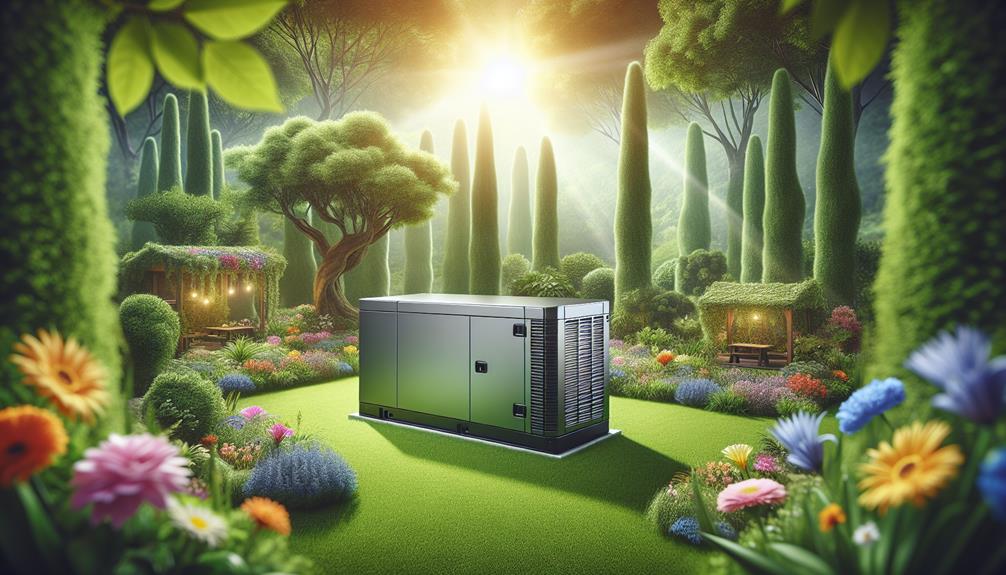Standby generators have become essential assets for many homeowners and businesses, providing a reliable power source during outages. The peace of mind that comes with knowing your property will remain powered in critical times is invaluable.
Stand By Generators
However, before investing in a standby generator, there are crucial considerations to keep in mind, such as the type of generator that best suits your needs and the proper installation requirements. Understanding these factors can make all the difference in ensuring your standby generator functions optimally when you need it most.
Stand By Generators
Key Takeaways
- Standby generators offer reliable backup power during outages for uninterrupted operation.
- Different types like gasoline, diesel, propane, and natural gas provide varying noise levels.
- Proper installation ensures safety and efficiency by complying with regulations and correct positioning.
- Regular maintenance is crucial for longevity, including oil changes, battery checks, and adherence to schedules.
Benefits of Standby Generators
Standby generators offer a reliable and automatic source of backup power during electrical outages, ensuring uninterrupted operation of critical systems and appliances. In times of emergencies, having a standby generator provides peace of mind knowing that essential functions can continue even when the main power supply is disrupted. These generators are designed to kick in immediately when a power outage is detected, seamlessly switching the electrical load to the backup source. This swift response guarantees that vital equipment such as medical devices, security systems, and communication networks remain operational, safeguarding both property and lives.
Stand By Generators
The ability to provide emergency power without manual intervention is a key advantage of standby generators. This feature is particularly beneficial for businesses, hospitals, data centers, and residential properties where constant power supply is essential. By automatically detecting power outages and supplying electricity within seconds, standby generators ensure that activities can proceed without disruption, underscoring their critical role in maintaining productivity and safety during unforeseen power interruptions.
Stand By Generators
Types of Standby Generators
In the realm of backup power solutions, different types of generators offer varying capabilities and features to cater to specific needs and requirements. When considering standby generators, it's essential to understand the available options in terms of fuel sources and noise levels.
Stand By Generators
Below is a table summarizing common types of standby generators based on their fuel options and noise levels:
| Generator Type | Fuel Options | Noise Levels |
|---|---|---|
| Gasoline Powered | Gasoline | Moderate |
| Diesel Powered | Diesel | Moderate |
| Propane Powered | Propane | Low |
| Natural Gas Powered | Natural Gas | Low |
| Dual Fuel | Gasoline or Propane | Varies |
Gasoline and diesel-powered generators are popular for their reliability, while propane and natural gas options are known for their cleaner emissions and lower noise levels. Dual fuel generators provide versatility by allowing the use of either gasoline or propane based on availability or preference. Consider your specific needs and the surrounding environment when selecting the most suitable type of standby generator for your requirements.
Installation Considerations
Efficient placement and proper wiring are key factors to consider when addressing the installation of standby generators. When installing a standby generator, the following factors must be carefully considered:
- Location requirements: Choose a location that complies with local regulations and manufacturer specifications to ensure proper ventilation and safe operation. Consider proximity to the main electrical panel and fuel source for ease of access during maintenance or emergencies.
- Noise levels: Position the generator away from living areas or sensitive locations to minimize noise disturbance. Installing soundproofing materials or enclosures can further reduce operational noise.
- Electrical connections: Hire a qualified electrician to handle the electrical connections, ensuring the generator is correctly integrated into the existing electrical system. Proper grounding is crucial for safety and performance.
- Fuel options: Select a fuel option based on availability, cost, and environmental considerations. Common choices include natural gas, propane, and diesel, each with its advantages and limitations. Choose a fuel type that aligns with your needs and preferences.
Maintenance Tips for Longevity
To ensure the prolonged functionality and optimal performance of a standby generator, diligent maintenance practices are essential for longevity. A troubleshooting guide can be invaluable in identifying and resolving common issues that may arise with the generator.
Regular seasonal maintenance is crucial for the smooth operation of the standby generator. Best practices include inspecting and changing the oil and filters, checking the coolant level, inspecting the battery, tightening electrical connections, and ensuring proper ventilation. It is recommended to adhere strictly to the manufacturer's maintenance schedule to prevent unexpected breakdowns and ensure the generator is always ready to kick in when needed.
Additionally, keeping a log of maintenance activities can help track the generator's performance over time and identify any patterns of concern. By following these maintenance tips diligently, one can significantly extend the lifespan and reliability of their standby generator.
Choosing the Right Size
Selecting the appropriate size of a standby generator is a critical factor in ensuring its efficiency and effectiveness during power outages. When determining the right size for your generator, several key sizing considerations should be taken into account to meet your specific power needs:
- Power Requirements: Calculate the total wattage of essential appliances and systems you want to power during an outage. Consider not only the starting wattage but also the running wattage for each item.
- Load Management: Evaluate if you need to power all appliances simultaneously or if a staggered approach can be adopted to reduce the overall generator size required.
- Future Expansion: Anticipate any potential increase in power needs due to new appliances or systems being added in the future to ensure your generator can accommodate these changes.
- Professional Assessment: Seek guidance from a professional to accurately determine the appropriate size based on your specific requirements and local regulations.
Frequently Asked Questions
Are Standby Generators Environmentally Friendly?
When evaluating the environmental impact of standby generators, it is crucial to consider factors such as their carbon footprint assessment and noise pollution mitigation. Assessing the carbon footprint helps determine the level of greenhouse gas emissions associated with their operation.
Additionally, implementing measures to mitigate noise pollution is essential to minimize the adverse effects on the environment and surrounding communities. These considerations are vital in determining the overall environmental friendliness of standby generators.
How Does a Standby Generator Impact Home Insurance Premiums?
Insurance coverage can be influenced by various factors, including the presence of certain features within a home. Premiums may increase if the property is deemed to have higher risks. Insurers assess risks associated with different aspects of a dwelling, impacting the cost of coverage.
Discounts may be available for homes equipped with safety features or devices that mitigate risks, potentially leading to savings on insurance premiums.
Can a Standby Generator Be Installed in a Condominium or Apartment Building?
When considering the installation of a standby generator in a condominium or apartment building, building regulations must be thoroughly reviewed to ensure compliance.
Assessing the electrical capacity of the building is essential to determine if the installation is feasible. Additionally, noise levels resulting from the generator's operation should be evaluated to prevent disturbances.
The installation process requires professional expertise to seamlessly integrate the generator into the existing infrastructure of the building.
Are There Any Restrictions on Where a Standby Generator Can Be Placed on a Property?
When considering the placement of equipment on a property, it is crucial to adhere to regulations concerning property boundaries, noise levels, and zoning laws. Ensuring compliance with these guidelines is essential for maintaining harmony within a community and avoiding potential legal issues.
Understanding the restrictions and requirements related to generator placement can help property owners make informed decisions that benefit both themselves and their neighbors.
What Are the Safety Considerations When Using a Standby Generator During a Power Outage?
When utilizing a standby generator during a power outage, safety is paramount. Precautions against carbon monoxide poisoning are essential due to the potential for exhaust fumes. Proper ventilation and placing the generator outdoors at a safe distance from windows and doors can mitigate this risk.
Additionally, monitoring for electrical hazards, such as overloading circuits or improper connections, is crucial to prevent fires or electrocution. Regular maintenance and adherence to manufacturer guidelines are key for safe operation.
Conclusion
In conclusion, standby generators provide a reliable source of power during outages, offering numerous benefits, including convenience and peace of mind.
With various types available, proper installation and maintenance are crucial for optimal performance and longevity.
Choosing the right size is essential to ensure adequate power supply.
By considering these factors, you can be better prepared for any unforeseen power interruptions.

